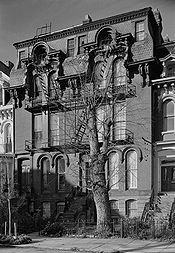Information from Wikipedia.
Bruce was born in Prince Edward County, Virginia near Farmville to Pettis Perkinson, a white Virginia plantation owner, and an African-American house slave named Polly Bruce. He was treated comparatively well by his father, who educated him together with his legitimate half-brother. When Blanche Bruce was young, he played with his half-brother. As Blanche Bruce was born enslaved, because of his mother's status, his father legally freed him and arranged for an apprenticeship so he could learn a trade.[1]
In 1850, Bruce moved to Missouri after becoming a printer's apprentice. After the Union Army rejected his application to fight in the Civil War, Bruce taught school and attended Oberlin College in Ohio for two years. Then he went to work as a steamboat porter on the Mississippi River. In 1864, he moved toHannibal, Missouri, where he established a school for blacks.
During Reconstruction, Bruce became a wealthy landowner in the Mississippi Delta. He was appointed to the positions of Tallahatchie County registrar of voters and tax assessor before winning an election forsheriff in Bolivar County. He later was elected to other county positions, including tax collector and supervisor of education, while he also edited a local newspaper. In February 1874, Bruce was elected by the state legislature to the Senate as a Republican. On February 14, 1879, Bruce presided over the U.S. Senate becoming the first African-American (and the only former slave) to do so.[2] Bruce served as theDistrict of Columbia recorder of deeds in 1891–93, and again as register of the treasury until his death in 1898.
On June 24, 1878, Bruce married Josephine Beal Willson (1853–February 15, 1923) of Cleveland, Ohio amid great publicity; the couple traveled to Europe for a four-month honeymoon. Their only child, Roscoe Conkling Bruce was born in 1879. He was named for New York Senator Roscoe Conkling, Bruce's mentor in the Senate. In 2002, scholar Molefi Kete Asante listed Blanche Bruce on his list of100 Greatest African Americans.[3]









0 comments:
Post a Comment